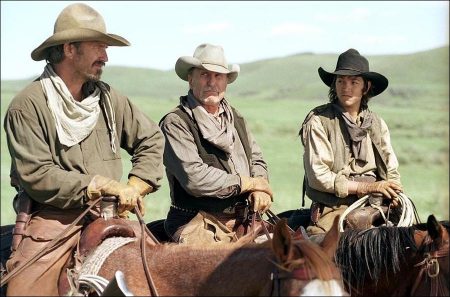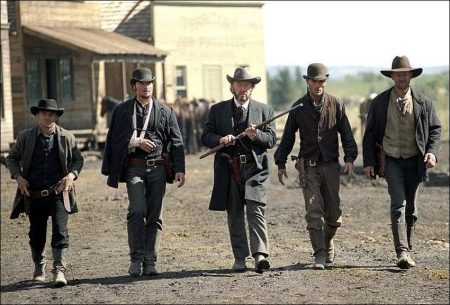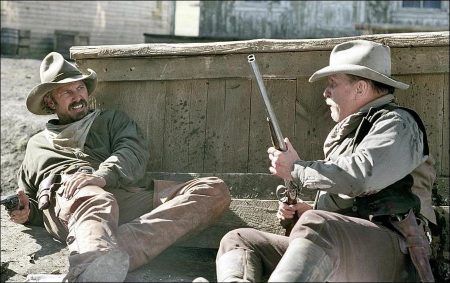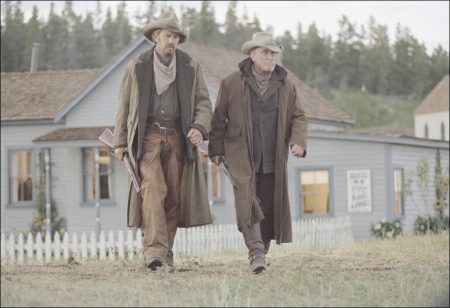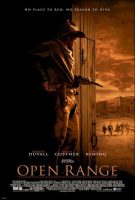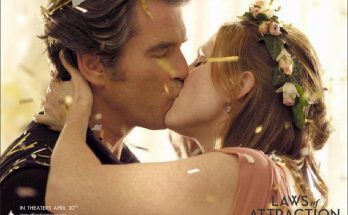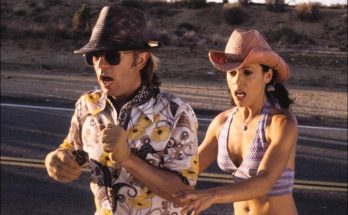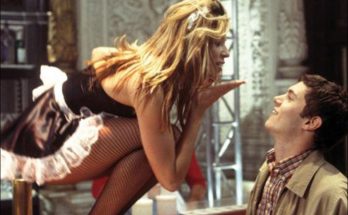Tagline: No place to run. No reason to hide.
Following the day-to-day encounters of four wandering cattle ranchers living in the final years of the Wild West, this film tells the story of how they eventually team up to rid a burgeoning remote town, Harmonville, from the machinations of a ruthlessly evil rancher, Baxter, who forms a sort of “outlaw state” where he makes the laws and rules, and enforces them using scare tactics and brute force.
Academy Award-winning director Kevin Costner (Dances with Wolves) helms this action-packed Western tale of a way of life that is quickly disappearing. Charley Waite (Kevin Costner), Boss Spearman (Oscar winner Robert Duvall), “Button” (Diego Luna) and Mose Harrison (Abraham Benrubi), are all men trying to escape their pasts— and the one place where a man can be free is on the open range, driving cattle in a land where nature makes the only laws. Bound to each other by the “Code of the West”—standing up for what’s right, showing loyalty to those closest to you—the cowboys try to avoid violence. But one frontier town that rules through fear and tyranny changes their lives and forces them into action.
Amidst this turmoil, life suddenly takes an unexpected turn for loner Charley when he meets the spirited Sue Barlow (Oscar nominee Annette Bening), a woman who embraces both his heart and his soul. As these courageous men prepare for the decisive battle that looms, they are also forced to confront and conquer their own internal demons.
With Open Range, Costner takes over directing chores for the third time in his career. His first foray into helming, 1990’s Dances With Wolves, earned him an Oscar for Best Director. Holding down three roles on his latest film “just worked out that way,” says Costner. “I find the scripts and develop them, and I have such an affinity for them that the moments become really important to me—how they stick in my mind. I’ve never thought of myself as just an actor.”
Set in the vast, epic landscape of the prairies, Open Range has all the elements of a classic Western. It reveals a unique slice of American history—the end of an era when land was not owned.A culture of cowboys known as “freegrazers” emerged—like Charley, Boss, Mose and Button—who roamed the countryside with their cattle and lived off the land. In Open Range, a ruthless, evil rancher (Michael Gambon) controls the town of Harmonville, making the laws and rules and enforcing them using scare tactics and brute force.
The four men must team up to fight this injustice. But here, the romantic image of the strong, silent cowboy with nothing but the shirt on his back and the shoes on his horse is given more depth with the help of Costner’s camera.
“In all Westerns you have enigmatic characters; you don’t know how they arrived or how they got to where they are. The only possessions they have are on their horse,” says Costner. “It’s a terribly romantic image, but if you think a bit longer, you wonder, what do they do when it rains? When they run out of food? They’ve got to go forage for themselves.They had to be very resourceful.We have this romantic view of the West when, in fact, it was terribly difficult.”
Writer / executive producer Craig Storper, who calls the Western one of America’s indigenous art forms, points out that Open Range adheres to the genre’s classic issues of freedom, justice, honor, love and friendship. But both director and writer wanted to go further than most Westerns usually allow and create authentic voices from the past.To do so meant infusing the story with an emotional depth and creating characters who rise above the clichés and wooden stereotypes often associated with the genre.
“The emotional lives of the characters, the lives they resist sharing with each other, are unexpectedly complex once you get past the walls they’ve each erected for self-protection,” says Storper. “It’s only the bad circumstances in which they find themselves that Touchstone Pictures Presents push them to reveal things that might’ve stayed buried, but ultimately lead them to be transformed.”
Kevin Costner emphasizes the use of language in the film to convey the complexity of the relationships between the men:“We really rely on the language that we created that shows how men deal with each other, and how they deal with their problems,” he explains. “And it deals with women—how we talk to them, how we treat them, and how we’re confused by them.”
Agrees Annette Bening:“When I read the script, I liked it because there was a classic feel to it, and yet a different sensibility. There’s a more sensitive sensibility about the way the men relate to each other.There’s an intimacy between the men that is beautifully written, and it’s very touching how their vulnerabilities are dramatized.”
Storper had written Open Range on spec four and a half years ago after optioning the book The Open Range Men from writer Lauran Paine. Storper never told the author about his efforts to get the project made because of the mercurial nature of Hollywood, opting instead to wait until production was a firm reality.
“Lauran was in his 80s and it just didn’t seem right to get his hopes up every time there was a hint of interest,” explains Storper. Then, in December 2001, Storper received a note from Paine’s wife that the author had died. When making the film finally became concrete, Storper called her with the news. “The moment I was able to tell her that Kevin was going to star in the movie she was just completely overwhelmed,” recalls Storper.
“She broke down crying on the phone, and it turned out that I had called her on her birthday. So being able to tell somebody whose husband had died and had always wanted to have a film made of his work, that Robert Duvall was going to star, that Kevin Costner was going to star, that Annette Bening was going to star—it was wonderful to be able to do that for her.”
It was a leap of faith to option the material considering modern Hollywood’s resistance to the genre. “The last really successful Western was Unforgiven,” says Storper, “and that was ten or twelve years ago. So trying to make a movie like this is like pushing a stone uphill in Hollywood, and you need some very strong muscle to push that stone. Still, as a storyteller, you have to believe that a good story will find its way to being told.”
The muscle turned out to be Costner. Costner met Storper through their agents, and the two immediately bonded through their common love for all things Western—a love, Costner argues, that most Americans share even though Hollywood has often been a somewhat disappointing voice for this integral part of American history.
“I think most people know that I have an affinity for the West,” says Costner, who, in addition to Dances With Wolves, starred in the Westerns Silverado and Wyatt Earp, “but it’s often surprising to me when people say, ‘I love Westerns’ because the number of Westerns you can name as great movies is not very extensive.They’re ‘black hat vs. white hat’ and not terribly appealing. But they are a part of our heritage. People have an enduring love of them.”
Costner approached Unforgiven’s producer, David Valdes, in January 2002 and, after serious discussions, the decision was made to go the independent route. London-based Cobalt Media Group came on board as the film’s foreign sales agent, and The Walt Disney Company acquired North American distribution rights.
Open Range (2003)
Directed by: Kevin Costner
Starring: Kevin Costner, Annette Bening, Abraham Benrubi, Robert Duvall, Michael Gambon, Diego Luna, Michael Jeter, Dean McDermott, James Russo
Screenplay by: Craig Storper
Production Design by: Gae S. Buckley
Cinematography by: James M. Muro
Film Editing by: Michael J. Duthie, Miklos Wright
Costume Design by: John Bloomfield
Set Decoration by: Mary-Lou Storey
Music by: Michael Kamen
MPAA Rating: R for violence.
Distributed by: Buena Vista Pictures
Release Date: August 15, 2003
Visits: 37
